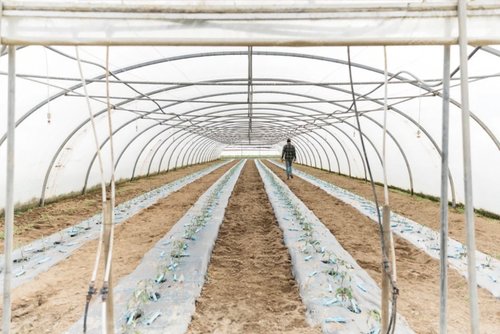“Many American workers and families break even at best.”
Nov 23, 2023
9 mins


Journalist and translator based in Paris, France.
How do we measure our standard of living? While projections for the US’s gross domestic product (GDP), a common indicator of how well a country is doing, are looking up, Americans from Cardi B to this disgruntled mom are feeling poor. No one’s shouting “recession,” but more than half of Americans are saving less in response to higher prices, according to a recent report from the Federal Reserve, while more than one-third of adults say they have more credit card debt than emergency savings – a 12-year high.
GDP figures indicate that the US is one of the wealthiest countries in the world, but that doesn’t tell us who holds that wealth. Even if it did, the results might not be enlightening, as even seemingly rich workers are struggling. At one stage, Silicon Valley engineers making six figures said they were not able to afford to rent near their headquarters. The pandemic only made things weirder: Geographic income inequality climbed, yet workers with the lowest pay benefited from some of the strongest wage growth. These discrepancies make it hard to plan for the future.
To understand what murky tectonic plates are lurking under these seismic shifts, Welcome To The Jungle spoke to Talmon Joseph Smith, investigative economics reporter for the New York Times. Reporting on everything from industry-wide scandals to the biggest wealth transfer in US history, Smith’s job is to take the country’s financial temperature. Here he discusses why economic theories don’t always match reality, whether social mobility actually happens through work, and the insidious difference between poverty and inequality.
In an interview with the New York Times, you said you didn’t major in economics because, in your words, “I often felt like what I could see in our economy, with my own two amateur eyes, didn’t match the equations in the curriculum.” What, exactly, didn’t match up?
I guess I could go into a couple of things, but the easiest to grasp is this idea that you learn very early on in standard orthodox econ that raising the minimum wage is surely going to threaten that populace with joblessness, and/or put businesses out of business.
Behind this is the idea that every good and service has a price — including labor. And if you raise the price of labor through a wage floor even incrementally, then incrementally, as much as you increase it, you’re making that good — or in the case of labor, service — more expensive and therefore less attractive. So businesses may hire fewer people, or not be able to afford to hire more people.
And that totally makes sense on paper. But in the real world, there’s this other thing called aggregate demand. And if an economy is operating in a way that is strong enough because there’s enough income — and income generally comes from labor — then you can offset the price of an enforced wage floor. And I just felt like, I’ve lived in a lot of cities where there’s just a lot of service work, and I’ve seen a lot of bosses. And growing up in New Orleans as an upper-middle-class kid, I was familiar with small business and mid-sized business bosses who were doing just fine and could absolutely afford to pay their people more. They just didn’t feel the need to because of a low-wage floor.
When I was in college – from 2012 to 2016 – we were operating in a pretty economically depressed time. But even back then, it made sense to me that as the economy got better and the labor market got tighter, causing people to get paid above the minimum wage, that this wouldn’t cause a recession or an uptick in unemployment because those people were also getting more income. And as they gain more income, they’re also consumers, and they can now afford more. They might actually become a customer of that very business, one of that business’s vendors.
So I understood at the base level being taught that, on paper, this line needs to meet this line in an equilibrium sort of framework. But I was also sympathetic to the idea that there were possibilities for win-win situations in society where both workers and businesses could do well, depending on the circumstance.
You also said, “I found myself revisiting how a lot of upward social mobility in this country can seem to come down to exceptional success stories or the support of family money.” Why are success stories exceptional?
I’d point to recent research done by the Brookings Institution’s Richard Reeves and three co-authors. Wealth status, as they put it, is “sticky.” So if you’re born into the bottom half of America’s wealth distribution, you’re likely to stay there, and vice versa. It doesn’t mean that there isn’t fluidity, that there isn’t social mobility in America. There is. And I think it’s important to not be dismissive of the American dream — not just out of cultural sensitivity, because it means a lot to people, but because there is still a big kernel of reality to it. Deep poverty has become less and less common in America, and that’s in part because it is still true that if you’re born into the bottom quintile, your odds of getting out of the bottom quintile by the time you retire are slightly better than half. So it’s not as if we’re bereft of any social mobility in this country. But I think, compared to the ideal that people aspire to and that their elected officials often parade, we’re often not matching that rhetoric with economic reality.
So do you think that, for most Americans, social mobility is possible through work?
I think that’s a slightly different question. And based on my reporting, I’m much more skeptical. I’ve been calling it “the futility of labor income as a means of getting ahead.” To put that into broader English: it’s the idea that, in America, you tend to build wealth and financial independence through homeownership in desirable areas near a limited stock of excelling public schools and other amenities, and/or through taking your savings and inserting those into equity markets, stocks, etc. Now, of course, what enables you to do either of those things — whether it’s homeownership or equity in the financial markets — is the ability to save and invest in the first place.
And the underlying tension of the eventual book I’m working on about inequality is that many American workers and families break even at best financially. But during darker periods, like after the 2007 to 2009 downturn, there was a snail-like jobs recovery and things were much worse for workers than they are now. So there’s a risk of downplaying how much progress has been made since then. The spread of income inequality has tightened, especially over the Covid-recovery era. Yet the average income for the bottom 50% is still roughly $28,000 per year. That’s technically not poverty level, according to the American government, but I think most of the people I cover in my work who are living and working and raising families would consider that to be a struggle, especially in light of the rising cost of living. And we’re talking about half of the population, give or take. So through one lens, you could say that the American dream is still alive in many ways, but under further inspection, it really is inconclusive.
Do you think this phenomenon of nearly half the country living on an insufficient income could damage the progress in social mobility that America has made?
Yeah. I think it absolutely could. Because, again, the ability to save and invest is what gives you the sort of opportunities that don’t just allow for financial health, but also mental health, literal physical health, the ability to provide social networks and social capital to your family and maybe even to friends.
Fiona Greig, the lead person on personal finance and retirement health at Vanguard Group — a big asset manager here in the States — concluded in interviews with me that the vast majority of Americans are not prepared for retirement, which is a base level requirement for being able to say that you are financially stable.
You’ve reported on a lot of different industries. Do you think some sectors provide more opportunity for social mobility than others?
That’s a good question. I think that workers are subject to the whims of what the market values in a given decade. There was a time, a half century ago, when our grandfathers had the ability to wake up at 5am and do maybe repetitive or not exactly intellectually rewarding work. But discipline, honest work and being able to manage a team was rewarded. Now, somebody who is totally not a morning person, isn’t disciplined in a traditional way, but has this sort of abstract brilliance about them —whether through some sort of art or writing or through something technical like engineering skills — that sort of person now can stay up late watching streaming, only really got going by 11am, but pick up the slack by 2pm and turn in something that needed to be done by 9 that night. And somebody who works that way in our current economy is highly rewarded, right? And the fact that they are a complete klutz or just unorganized in some other traditional ways doesn’t matter.
So the economic marginal value of old-timey discipline has fallen. Whereas, “Work smarter, not harder” and “Can you just get this done for me on time? I don’t care how long it takes you to do it” mentalities are now rewarded. And you’ve seen folks in tech reap the rewards. I don’t think there’s anything uniquely generous about bosses in tech. It’s just through a mixture of how our economy has changed and the way those industries work.
Maybe this is business-friendly propaganda slipping into my analysis, but I’m just skeptical of the idea that there are jobs or certain sectors that are inherently more generous to workers than others.
In your report on wealth transfer, you say some economists and financial planners make the case that the widening wealth gap may be inevitable. Why would it be inevitable?
Because of a funny little thing called compound interest, which is just financial physics. So if you have $100 and each year it grows at a rate of 7% — which is really solid — many years on, that $100 will be much more than $100. And that’s great for you. But imagine you start out with $100,000 or $1,000,000 that grows at a rate of 7% per year. Then I think we can all understand the math that those who start out with little are almost always going to have less than those who have had their financial wealth compound when they started off with much, much more.
Another way to think about it is: the top 1% owns a larger share of the United States’ stock market. So if the stock market goes up, oftentimes inequality goes up. And so there’s a functional question of what sorts of inequality to be upset with, or to question, and which ones are automatically built into how certain financial assets or markets work.
So which ones are you, personally, upset with and questioning?
Well, I’m a reporter, a hard news reporter that doesn’t have any opinions.
You know, that’s why this is a Q&A.
Yeah, but as a human and as somebody who spends a lot of time with people in my reporting, there’s this broader question about the baseline standard of living: Are these loftier ideas of inequality coming from 30,000 feet as crucial as considering whether the folks I’m interviewing are upset or not? You know, Americans, especially compared to other countries, like many of their billionaires. They admire them, want to be them. And I think what people are often upset about is, “How can we have billionaires when blank.” And everybody can fill in the blank with the various shortcomings they’re most perturbed by. I think that’s ultimately the source of frustration. How can so much massive wealth be accumulated yet nothing can be done about baseline standards of living?
So I don’t spend much of my time questioning, “What is the deleterious effect of another billionaire?” But rather, “How is it that this wide swath of people are making relatively low wages? What is it that leads them to not be able to live a life that doesn’t meet their expectations, their potential or the dignity that many people think most folks deserve?”
And so far in your research, what have you concluded is stopping workers from living the lives that they deserve?
I think, in America, there’s a very chaotic patchwork of market and government systems that we’ve created that have a lot of holes in them, as well as dysfunctions that are hard to reconcile and keep track of. I think often we look at today’s status quo and imagine that our forefathers purposely designed it to be this way. When, in reality, through a very complicated historical series of trade-offs made at the federal, state and local level – throughout the course of ideologies that reigned at a time and then were challenged, and then fell, and then reasserted themselves again – we have this jigsaw puzzle of a market society. And jigsaw puzzles are hard to solve. A lot of things and people fall through the cracks.
What I’m excited to cover is how this generation of Gen Xers and Millennials — and soon enough, zoomers — what they make of it, and what they do with our market society. There are plenty of changes that can be made, whether it’s wages, welfare, state taxation, tax preferential treatment of certain things that firms do or tax disadvantages for firms that do things society decides we don’t want them to do. It’s a wide and vibrant array of possibilities we have going forward.
Photo: Brad Ogbonna for Welcome to the Jungle
Follow Welcome to the Jungle on Facebook, LinkedIn, and Instagram to get our latest articles every day, and don’t forget to subscribe to our newsletter!

More inspiration: Society for workers

How auto unions are advancing the idea of a shorter working week for all
As support for the 4-day workweek keeps gaining steam, the industry that ushered in the 5-day workweek is still at the forefront
Nov 27, 2023

When your workplace is literally toxic — but you’re a kid
In the US, caustic chemicals, scalding appliances, and dangerous machinery are all in a day’s work for a growing body of exploited children.
Nov 07, 2023

So, are robots really coming for our jobs? A conversation with futurist Gary Bolles
Fears of an AI apocalypse loom large, but what are experts saying about the future?
Mar 07, 2023

With a universal income, will we stop working?
Universal income is gaining traction in Europe, but questions about essential jobs remain…
Dec 21, 2022

Will working for a DAO be better than a corporate job?
Some say it's the democratization of work. Others warn of toxic power structures... so what's the deal with decentralized autonomous organizations?
Nov 10, 2022
The newsletter that does the job
Want to keep up with the latest articles? Twice a week you can receive stories, jobs, and tips in your inbox.

Looking for your next job?
Over 200,000 people have found a job with Welcome to the Jungle.
Explore jobs

